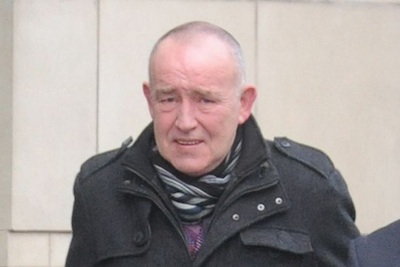
Days after self-confessed British Crown force killers were broadcast justifying the murder of innocent civilians, the jailing of a former IRA Volunteer for an armed action in 1981 has been described as “vindictive”.
At Belfast Crown Court on Thursday, Armagh man Seamus Kearney was convicted for an IRA attack in which a member of the RUC police died. The judge, sitting without a jury under special anti-republican Diplock legislation, sentenced Mr Kearney to life imprisonment.
Under the terms of the 1998 Good Friday Agreement, Mr Kearney will serve two years before being released on licence.
Following the sentencing, Sinn Féin representative for mid-Ulster Ian Milne said: “I know Seamus Kearney well. He previously served a long period of imprisonment for IRA activities.
“The decision to pursue Seamus on these historic charges was wrong, vindictive, unnecessary and counterproductive.”
He added: “It is ironic at a time when the Haass process is coming to a conclusion in dealing with legacy issues that a republican is being imprisoned on historic changes.
“It seems that the British government on one hand wants to talk the language of building a new future here but at the same time is sending a message that it is continuing to fight old battles.
“Like the previous case of Gerry McGeough, it is our position that Seamus should be released and allowed to return home to his family.”
The DUP’s Jeffrey Donaldson hit out at Sinn Féin’s reaction, which he claimed showed “a callous disregard for the suffering and pain inflicted by the IRA” on the family of the RUC Reservist, John Proctor.
The continuing prosecution of former members of the Provisonal IRA, nineteen years after that organisation declared a ceasefire, stands in contrast to the continuing failure of the Stormont system to prosecute members of the British Crown forces or its murder gangs.
‘SHAM’
The family of an 18-year-old Catholic youth shot dead in 1972 by a secret British Army unit have said this week they have been forced to take legal action against the British Ministry of Defence (MoD).
Daniel Rooney was gunned down by undercover soldiers from the British Army’s ‘Military Reaction Force’ at St James’s Crescent in west Belfast. A BBC Panorama documentary, shown last week, carried interviews with members of the unit, who admitted that they killed members of the nationalist community even though there was no evidence they were involved with the IRA.
The Rooney family are to issue civil proceedings against the MoD in relation to the conduct of their soldiers. Noel Rooney, Daniel’s brother, described the 1973 inquest into his death as a “sham”, saying none of the soldiers involved gave evidence at it. As well as a fresh inquest he said the family wanted the soldiers responsible to be brought to court, although he does not think this would happen.
“We would not have any confidence that any of these people would be prosecuted. We would certainly like to see it happen,” he said. “The family are supportive of anything that will get to the truth and the [Panorama] programme helped with that.
“It exposed something that we knew all along. My mother wanted Daniel’s complete innocence to be known and wanted a British government apology.” He said his mother, who died several years ago, “never got over” her son’s death.
Mr Rooney said he was shocked that the Military Reaction Force was “organised at such a senior level”. And he said he was appalled by the “arrogance and ruthlessness” of the soldiers who appeared on the programme.
“They said they would do it again,” he said. “They were quite open and brazen about it.”
![[Irish Republican News]](https://republican-news.org/graphics/title_gifs/rn.gif)
![[Irish Republican News]](https://republican-news.org/graphics/title_gifs/harp.gif)

